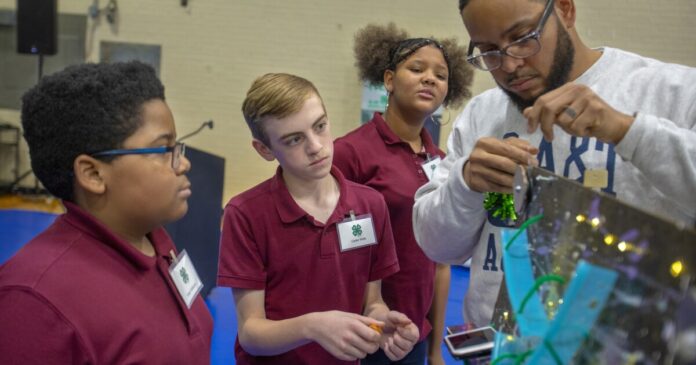North Carolina A&T State University recently became the only public institution in the state to offer a degree in artificial intelligence.
Along with teaching college students AI literacy, educators at the university are also working on doing the same with students under 18.
The public HBCU is part of a national Google Initiative to boost AI education. The $25 million project includes ten states across the U.S., all working to develop an AI curriculum for K-12 students.
Mark Light is the co-chair of the initiative and the 4-H STEM specialist at N.C. A&T. He said the curriculum will change depending on the students’ age.
Elementary to middle school-aged students will learn about the building blocks of AI, such as how it’s created, where the data comes from, and how it’s utilized. Light said one way they plan to teach this information to younger students is through the video game Minecraft.
“Minecraft is one of those things that they get excited about,” Light said. “And so, you do what I call stealth STEM. Where you sneak the STEM into an activity such as a robot, a video game, a drone, something that they find interesting. And then you teach the STEM perspectives, in this case artificial intelligence, by hiding it within a game.”
N.C. A&T State University College of Agriculture and Environmental Sciences
Since high school students likely have more experience with artificial intelligence, their arm of the curriculum will focus on how to use AI tools responsibly.
Light said there is a lot of fear about students using AI to cheat or shortcut assignments, similar to how the introduction of calculators in the classroom were once looked at as a negative.
“We thought no kids are going to learn math anymore if we let the calculators into the classroom,” Light said. “Now, most of our high school students have to buy calculators to go to school. And so, if we look at it from that mindset, that AI is a tool and we can use it for positive or negative use — that’s one approach we’re trying to do with this AI education.”
The curriculum will also be shaped by three lenses: agriculture, equity, and the foundation of AI. Light said the committee decided on these focus areas to address gaps in AI education and resources that are already available.
Another gap the initiative seeks to address is AI literacy among underserved populations. Light said there are several tech hubs in North Carolina where neighboring school districts readily have access to AI resources and technology. But that’s not the same for rural parts of the state.
“We have some digital divide,” Light said. “By filling those gaps, then those students become prepared as well for the challenges and careers in their future, and they won’t be left behind.”
N.C. A&T State’s 4-H program works in all 100 counties in North Carolina, as well as the Eastern Band of Cherokees.
Overall, North Carolina’s goal is to reach 15,000 youth across the state by the initiative’s end in May 2026. There’s also a goal to train 2,000 adults in AI education within that same time frame.
James Parker
/
N.C. A&T State University College of Agriculture and Environmental Sciences
Light said the initiative will equip both teens and educators with AI training to help reach this objective. For educators, this could include training in school districts and conferences.
High school students will be trained to teach the curriculum to other youth and adults in their communities.
“If I come into a classroom, maybe they’re listening,” Light said. “But if a peer comes into the classroom, there’s that understanding and they’re more open to learning content because they’re being taught by a teen.”
Light said the hope is to have 35 teen leads this year.
Each of the ten states involved in the initiative will test the curriculum in their respective programs. After that, Light said the plan is to develop a national platform that can be used across the U.S.
“Then, that’ll be available for any youth and family that wants to learn about AI education,” Light said. “So, this grant keeps having a reciprocal effect to where it’s not just North Carolina, it’s not just the 10 states, but eventually we’ll be able to reach all youth and families.”
WUNC partners with Open Campus on higher education coverage.
